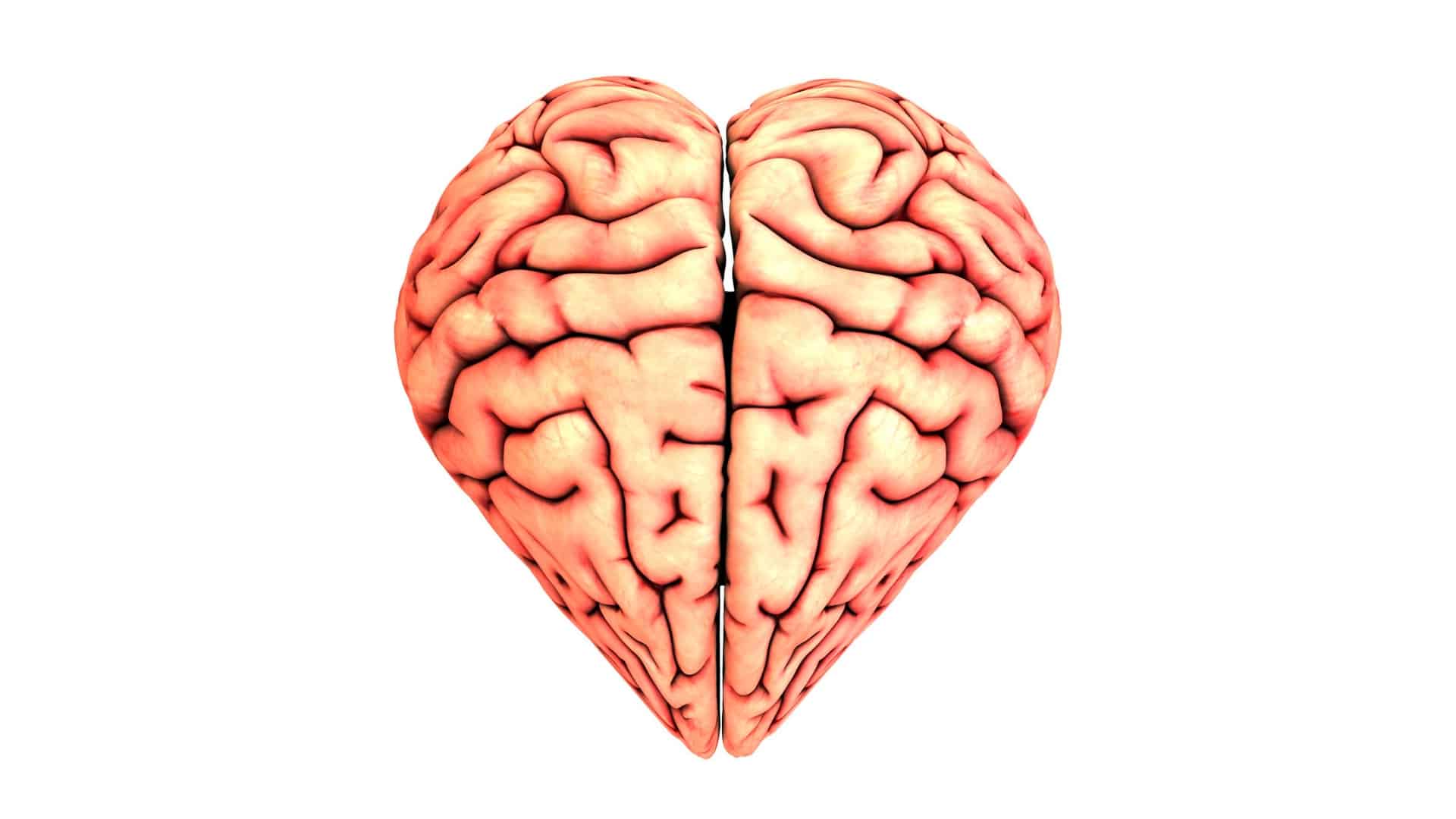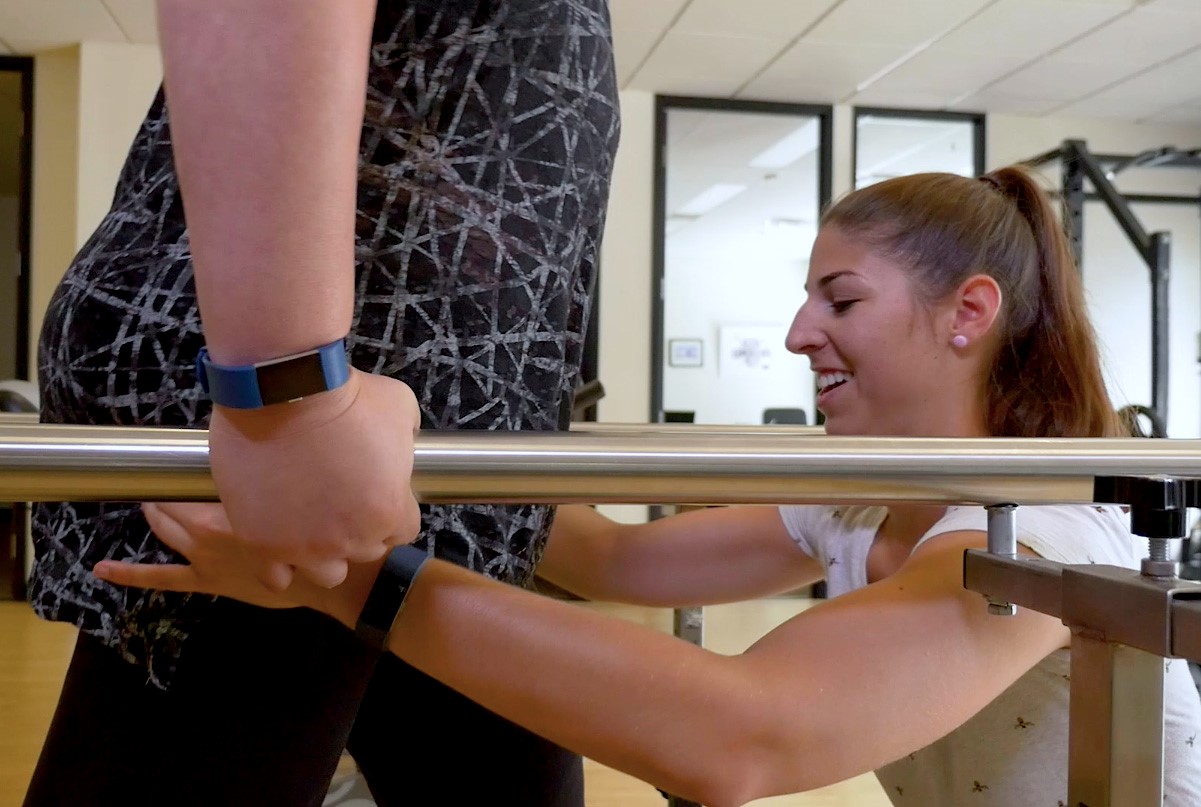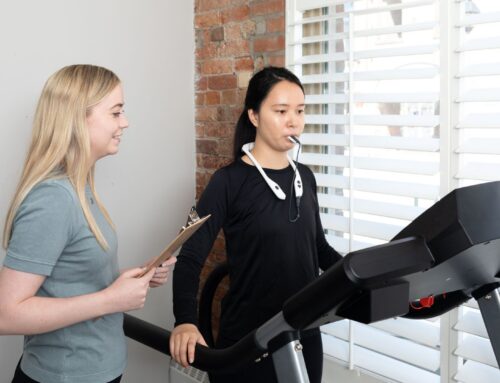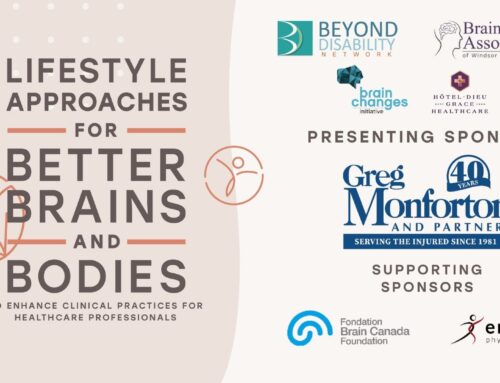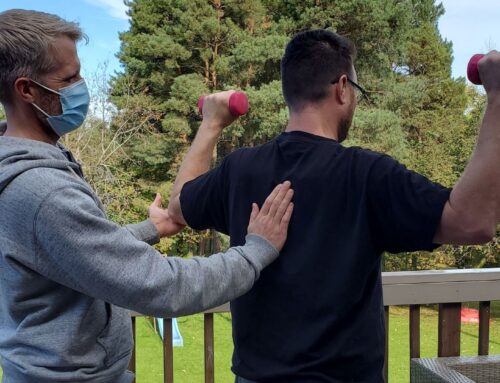Traumatic brain injury (TBI) can result in impairments of neurological, cognitive and physical functions. The effects of TBI on heart health can be complex and variable due to several factors, including age, stage of brain injury and symptoms.
In this article, we will take a closer look at some of the effects, specifically heart rate variability, resting heart rates, and anxiety. In addition, we examine some research around controlled exercise rehabilitation for post-concussion syndrome.
Table of Contents
- What happens to the body when you sustain a traumatic brain injury?
- Symptoms of traumatic brain injury
- Effects of TBI on heart rate variability
- Effects of TBI on resting heart rates
- Controlled exercise rehabilitation for post-concussion syndrome
- Persistent symptoms of traumatic brain injury
- Traumatic brain injury and anxiety
- Conclusion
What Happens to the Body When You Sustain a Traumatic Brain Injury?
When someone sustains a traumatic brain injury (TBI), whether categorized as mild, moderate, or severe, many physiological processes of the body can change. For example, the nervous system’s ability to regulate the heart during a physical stimulus such as physical activity, or a cognitive stimulus such as emotional stressors can be affected.
This dysfunction is due to changes that have occurred to the connection between the brain and the specific body part that the nervous system controls, in these specific cases, the heart.
In order to tolerate physical activity, heart rate range can change based on age and the stage of brain injury. For example, a child with a traumatic brain injury may not be able to tolerate running around playing tag with their peers due to the inability of the child’s nervous system to maintain an elevated heart rate compared to a child without a traumatic brain injury.[i]
A person’s symptoms can dictate whether they can tolerate an activity. Depending on the nature and severity of the brain injury, tasks varying from getting in and out of bed to sprinting on a treadmill could trigger symptoms.
Symptoms of Traumatic Brain Injury
According to Brain Injury Canada, symptoms of a traumatic brain injury can be physical, cognitive, or emotional.[ii] Some examples of symptoms include:
- Fatigue
- Changes in vision
- Lightheadedness
- Ringing in the ears
- Dizziness
- Difficulty concentrating
- Difficulty with decision making
- Difficulties with sleeping
Propel Tip: Did you know that when someone sustains a brain injury, the ability for that person to regulate their heart health changes?
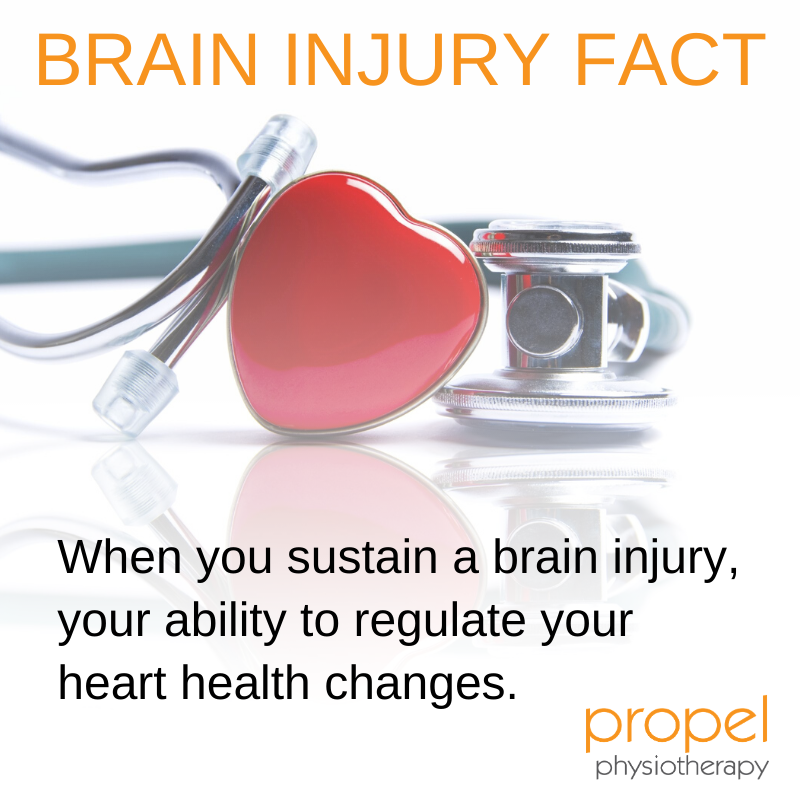
You may also enjoy reading: How Vertigo Can Throw Your Whole World for a Loop
Effects of TBI on Heart Rate Variability
Heart rate variability (HRV) is a measure of fluctuation around the mean heart rate; it reflects the sympathetic and parasympathetic balance of the autonomic nervous system. It is a marker to study cardiovascular tone in patients with neurological injuries[iii]
Heart rate variability can be categorized into time and frequency. The time domain indicates the distance between each heartbeat, which is measured in milliseconds, while the frequency domain indicates the number of times the heart beats in one minute.
It is important for the nervous system to be able to regulate your heart rate efficiently in order to decrease the risk of cardiac events and to be able to bring equilibrium to all parts of the body. A person with high heart rate variability is associated with being more resilient to stressors of everyday life. This person’s autonomic nervous system would be working optimally. If a person’s heart rate variability is low, it is associated with an overactive sympathetic nervous system, which is less flexible and less resilient to change. This person’s autonomic nervous system would not be working optimally.
In general, heart rate variability is decreased in individuals with traumatic brain injury between the first six months due to the imbalance between the sympathetic and parasympathetic nervous system.
Fortunately, research has shown that heart rate variability, in those with traumatic brain injury, can improve compared to individuals without traumatic brain injury as one’s condition progresses into the chronic phase.[iv]
You may also enjoy reading: How to Reduce Heart Disease Risks
Effects of TBI on Resting Heart Rates
For most healthy adults, a normal resting heart rate is somewhere between 60 to 100 beats per minute. For people with traumatic brain injuries, their resting heart rate lies closer to the upper range of the normal resting heart rate (ie. 90 to 100 beats per minute). Again, this would mean that the nervous system is experiencing autonomic dysregulation, meaning a decreased ability to reach balance between the sympathetic and parasympathetic nervous system.[iv]
Generally, a lower resting heart rate can indicate that one’s heart is working more efficiently by pumping more blood through the body with less beats per minute. For example, an athlete could have a normal resting heart rate as low as 40 beats per minute.
Additionally, one’s resting heart rate can also be affected by:
- Age
- Medications
- Physical activity level
- Being a smoker
- Emotions, such as stress
Controlled Exercise Rehabilitation for Post-Concussion Syndrome
For individuals with post-concussion syndrome, the heart rate range can vary from person to person because of the nervous system’s decreased ability to reach equilibrium.[v]
Furthermore, one’s ability to continue exercising depends on the heart rate threshold in which the onset of post-concussive symptoms occurs. Specifically, research supports the use of controlled exercise rehabilitation as treatment for post-concussion syndrome, such as an individualized treadmill program.[vi]
The exercise treatment for post-concussion syndrome is beneficial when it is catered specifically to the person, controlled in a quantitative manner (ie. below symptom onset heart rate progression), and administered at the appropriate time after concussion.[vii]
For example, when one individual’s heart rate increases to 110 beats per minute, one may experience blurry vision and an overwhelming need to stop their activity to lower their heart rate. With the above recommendation, the individual would be working at a lower heart rate and progressively increasing the working heart rate in order to ensure that symptoms are not exacerbated. In simple terms, this person would still be exercising at a meaningful intensity, without flaring up their post-concussive symptoms.
You may also enjoy reading: Can Exercise Improve Brain Health
Persistent Symptoms of Traumatic Brain Injury
Individuals who have sustained a mild traumatic brain injury often report persistent cognitive symptoms,[viii] including:
- Post-traumatic headache
- Sleep disturbances
- Mental health disorders
- Cognitive difficulties
- Vestibular and vision dysfunction
- Fatigue
With the above persistent symptoms in mind, best practice guidelines suggest that primary care providers, such as physicians or physiotherapists, consider factors that may be contributing to one’s post-concussive symptoms.[ix]These symptoms should be investigated with referrals being made to appropriate healthcare practitioners in order to develop an effective management strategy.
You may also enjoy reading: Vestibular System and Balance
Traumatic Brain Injury and Anxiety
Following a mild traumatic brain injury, anxiety is one of the most frequently diagnosed emotional disorders.[x] According to one research study, individuals with mild traumatic brain injury were more likely to develop anxiety compared to individuals with no mild traumatic brain injury.
Propel Tip: Did you know that anxiety is one of the most frequently diagnosed emotional disorders after someone sustains a traumatic brain injury?
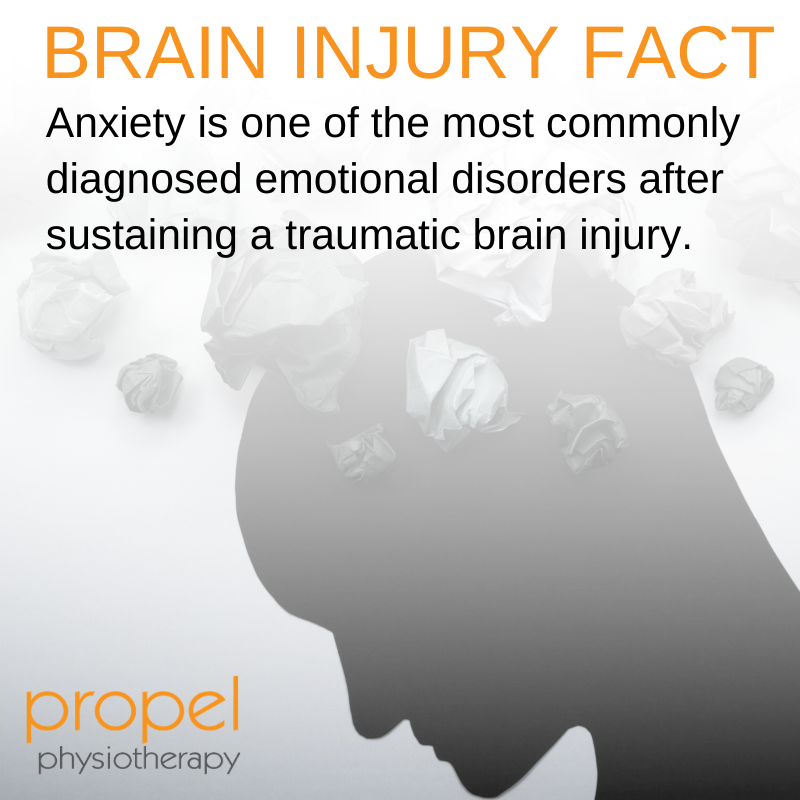
As discussed previously, autonomic nervous system dysfunction following a traumatic brain injury means that specific areas of the brain are unable to regulate stress and stimuli like it did pre-accident. As a result of the brain injury, the specific parts of the brain become overly sensitive.
This sensitivity to stress and stimuli can cause one’s heart rate to fluctuate more often. When these areas of the brain are unable to regulate stress and stimuli effectively, the likelihood of someone experiencing anxiety becomes higher.[x]
Conclusion
Properly addressing traumatic brain injury can be complex and overwhelming. Survivors of traumatic brain injury have various problems in daily life that affect almost every sphere of life and are at higher risk for conditions like diabetes and heart disease. TBI results in impairments of neurological, cognitive and physical functions leading to activity restrictions and lack of participation in all aspects of society.
At Propel Physiotherapy, we have built our practice around the treatment of complex neurological injuries such as traumatic and non-traumatic brain injury. Our skilled professionals have training and experience working with those who have suffered a brain injury and addressing the chronic conditions and complications that follow.
Think you or someone you know would benefit from physiotherapy services related to a traumatic brain injury? Get in contact with us!
References
[i] Katz-Leurer M, Rotem H, Keren O, Meyer S. Heart rate and heart rate variability at rest and during exercise in boys who suffered a severe traumatic brain injury and typically-developed controls. Brain Inj. 2010 Feb;24(2):110-4. doi: 10.3109/02699050903508234. PMID: 20085448.
[iii] King ML, Lichtman SW, Seliger G, Ehert FA, Steinberg JS. Heart-rate variability in chronic traumatic brain injury. Brain Inj. 1997 Jun;11(6):445-53. doi: 10.1080/026990597123421. PMID: 9171929.
[iv] Keren O, Yupatov S, Radai MM, Elad-Yarum R, Faraggi D, Abboud S, Ring H, Groswasser Z. Heart rate variability (HRV) of patients with traumatic brain injury (TBI) during the post-insult sub-acute period. Brain Inj. 2005 Aug 10;19(8):605-11. doi: 10.1080/02699050400024946. PMID: 16175814.
[v] Leddy JJ, Haider MN, Ellis M, Willer BS. Exercise is Medicine for Concussion. Curr Sports Med Rep. 2018 Aug;17(8):262-270. doi: 10.1249/JSR.0000000000000505. PMID: 30095546; PMCID: PMC6089233.
[vi] Baker JG, Freitas MS, Leddy JJ, Kozlowski KF, Willer BS. Return to full functioning after graded exercise assessment and progressive exercise treatment of postconcussion syndrome. Rehabil Res Pract. 2012;2012:705309. doi: 10.1155/2012/705309. Epub 2012 Jan 16. PMID: 22292122; PMCID: PMC3265107.
[vii] Baker JG, Freitas MS, Leddy JJ, Kozlowski KF, Willer BS. Return to full functioning after graded exercise assessment and progressive exercise treatment of postconcussion syndrome. Rehabil Res Pract. 2012;2012:705309. doi: 10.1155/2012/705309. Epub 2012 Jan 16. PMID: 22292122; PMCID: PMC3265107.
[viii] Purkayastha S, Stokes M, Bell KR. Autonomic nervous system dysfunction in mild traumatic brain injury: a review of related pathophysiology and symptoms. Brain Inj. 2019;33(9):1129-1136. doi: 10.1080/02699052.2019.1631488. Epub 2019 Jun 20. PMID: 31216903.
[ix] Marshall S, Bayley M, McCullagh S, Velikonja D, Berrigan L, Ouchterlony D, Weegar K; mTBI Expert Consensus Group. Updated clinical practice guidelines for concussion/mild traumatic brain injury and persistent symptoms. Brain Inj. 2015;29(6):688-700. doi: 10.3109/02699052.2015.1004755. Epub 2015 Apr 14. PMID: 25871303.
[x] Liao KH, Sung CW, Chu SF, Chiu WT, Chiang YH, Hoffer B, Ou JC, Chen KY, Tsai SH, Lin CM, Chen GS, Li WJ, Wang JY. Reduced power spectra of heart rate variability are correlated with anxiety in patients with mild traumatic brain injury. Psychiatry Res. 2016 Sep 30;243:349-56. doi: 10.1016/j.psychres.2016.07.001. Epub 2016 Jul 1. PMID: 27449003.
Written by

